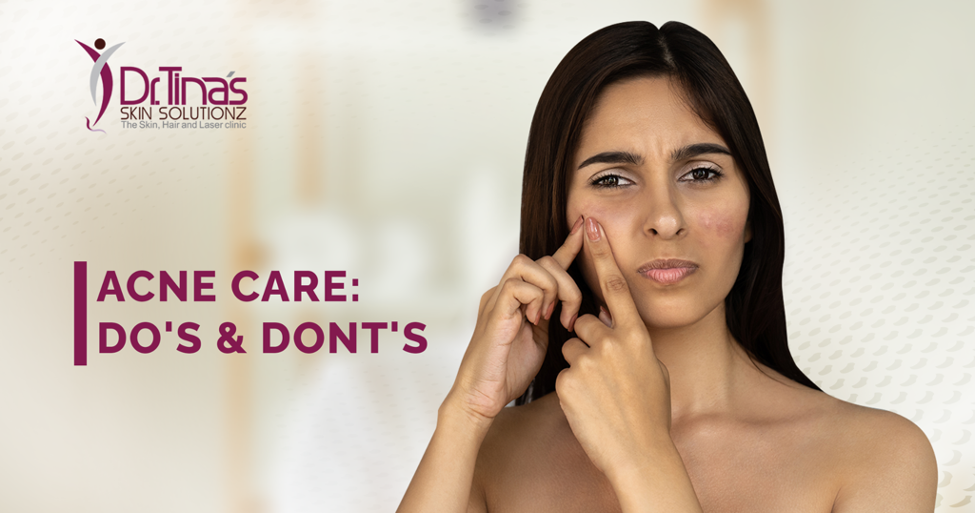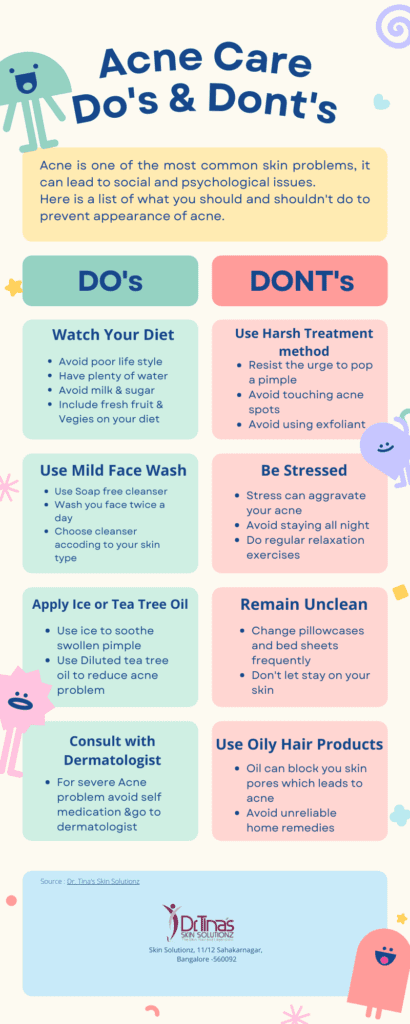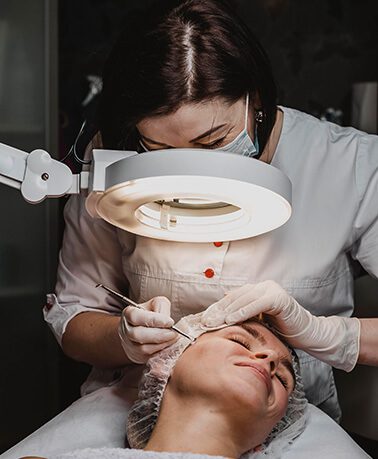What are Some Do’s and Don’ts for Acne-Prone Skin?

Imagine this : You wake up to a beautiful day, early in the morning, wash your face, check the mirror, and there it is – a particularly unpleasant-looking acne on your forehead staring right back at you! Frustrating, right?
While acne is one of the most common skin problems, it can lead to social and psychological issues
There are many reasons behind the appearance of acne or zits
Such problem arises due to clogging in the hair follicles under the skin surface, reasons being Hormonal, nutritional, environmental, day to day stress, etc The situation gets further exacerbated if you try to pick them with nails and/or use random face washes with harsh chemicals to wash your face repeatedly. While home remedy seems tempting, to use and move on, It is always a good idea to consult a dermatologist, discuss the problem with him/her, and treat the acne problem accordingly.
Here Are Few Acne Do’s and Don’ts:
Do: Watch Your Diet
Poor lifestyle is one of the key reasons behind persistent acne problems. You need to align towards well being of your body, eating the right whole food groups You need to have plenty of water throughout the day. Watch your carbs though, anything which will increase your blood sugar steeply should be reduced, and stay away from fizzy drinks (or any beverage with artificial sweeteners).
Studies have revealed that increased consumption of dairy products (skimmed milk in particular) and gluten, that is wheat products can make the acne problem worse. Cut down on milk cheese and chocolate consumption.
Go for a balanced diet that includes a lot of fresh vegetables, fruits and lean proteins. Apart from gradually easing your acne, a healthy diet will help you get glowing skin too.
Do: Makeup Acne and the Social Anxiety
Acne is a social concern and in client-facing roles or when you have to meet people in social gatherings, there is an anxiety associated with it and a tendency to hide the acne or not socialise at all. Such makeup generally tends to block the skin pores. That, in turn, might result in the appearance of even more acne – something you do not want.
Did you know you have acne-friendly products for camouflaging the blemish, so you can confidently apply and go about your day .
Check with a dermatologist to know more about what would suit your skin type to cover the acne.
Focus on keeping your skin free from bacteria and oil accumulation through appropriate creams which not only hydrate oily skin but prevent bacterial accumulation. There are specific formulations for not only hydrating but also reducing the bacteria “propionibacterium acnes”, using mineral makeup (powder can also work fine). Make it a point to keep your makeup sponges and brushes clean.
Do: Wash Your Face With Mild Cleansing Solutions
Dermatologically, washing the face with an appropriate cleanser is recommended only twice a day.
According to your skin type, a cleanser can be a mild soap-free cleanser having Cetyl alcohol and Steryl alcohol or specific to acne containing benzoyl peroxide and salicylic acids based. Not all acne respond to these specific face washes, without guidance a cleanser can be harmful, please be aware before you start anything off the counter which says for acne-prone skin. It can damage, if the application of the cleanser causes any type of skin irritations/allergies, inform your dermatologist immediately.
Do: Apply Ice and/or Tea Tree Oil with precaution
At times, pimples and acne spots get swollen. In such cases, the top dermatologists in Bangalore often recommend the application of ice on the affected area. While it might not be effective for everyone, the application of ice can reduce swelling significantly.
Diluted tea tree oil is yet another home-based solution that you can try, to reduce acne problems. Ideally, apply the oil on a small spot in the hand – to check whether you have any allergic reaction.
In general, stay away from over-the-counter (OTC) medications (creams, pills, etc.) without being certain about their probable side effects. Contrary to what many believe, things like crushed aspirin or aspirin paste are generally not useful for acne treatment either.
Do: Talk With A Qualified Dermatologist
For a standalone pimple that goes away on its own, consulting a skin doctor might not be necessary. However, if there are recurring acne breakouts – do not self-medicate, and avail the services of a reliable dermatologist near you for proper acne scar treatments. Look for skin specialists who have proper experience in dealing with acne-related problems.
Self-medication is, in fact, one of the worst ways to try and remove acne issues. Different OTC medicines have different effects on people – and the side-effects might become more serious than the acne problem itself.
Don’t: Use Harsh Treatment Methods
Resist the urge to pick and pop the pimples and acne on your face. While it might seem good at the time – there is every chance of the skin getting discoloured and permanent scars forming. Do not touch the acne spots frequently either.
There is a tendency among people to rub their faces (in general), and the acne-affected spots (in particular) vigorously. Avoid doing this, since it will worsen your acne problem.
Do not apply any skin toner, exfoliant or astringent on the affected area(s) without consulting your skin doctor. These can cause further skin irritations and resultant damages.
Don’t: Put Yourself Under Stress
While looking for medications for acne treatment, the adverse effects of mental tensions and stress often get glossed over. The fact remains, however, that too much stress generally leads to the destruction of healthy skin cells or excessive oiliness. Skin inflammations can appear, and there can be acne breakouts.
There are many easy relaxation exercises – like yoga, free hand exercises, music, regular reading – that bring down overall stress levels, and keep the body relaxed. If stress goes out of hand, acne problems become more serious.
Must Read : 5 Useful Insights from a Skin Specialist on Stress-Induced Acne Breakout
Getting enough sleep is another powerful method to drive away excessive stress. Go to bed at regular times, unclutter your mind, and sleep well & for long enough. You will look and feel fresh.
Don’t: Remain Unclean & Use Oily Hair Products
Cleanliness is a big part of the overall acne treatment regime. Make sure that your pillowcases, bed sheets, and other bed linen are changed and cleaned regularly. This will prevent accumulated bacteria/germs from getting transferred to your skin.
Do not let sweat stay on your skin – since that would block the skin pores further. Use a gentle cleanser to wipe off the perspiration and wash the face.
Keep in mind that your hair comes in constant contact with your face (the forehead, in particular). If you use oily hair products, the oil will block the skin pores even more – and your acne problem might become more worrisome. On average, nearly 80% of all adolescents are affected by acne attacks (in varying degrees of severity) – making it an extremely common problem. Instead of trying unreliable home remedies or applying unsuitable chemicals, educate yourself with the causes for acne and how you can do lifestyle modifications to reduce the acne, remember to contact a skin care specialist, it’s always in your best interest to go for a safe and systematic remedial treatment that would help you get rid of acne and blemishes.


Dr.Tina Ramachander is one of the best dermatologist in Bangalore and Medical Director at Dr.Tina’s Skin Solutionz, a skin care clinic in Bangalore. She completed her master’s in dermatology from the well acclaimed JJM Medical college in Karnataka and is now a practicising dermatosurgeon and Medical Cosmetologist in Bangalore.

